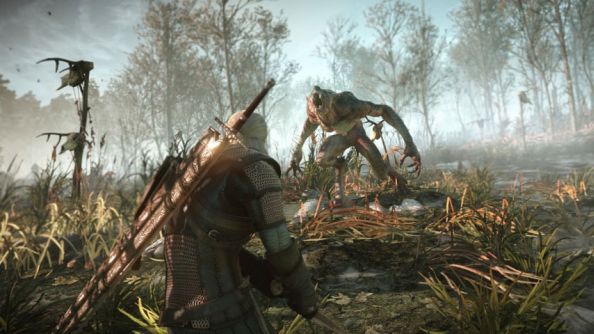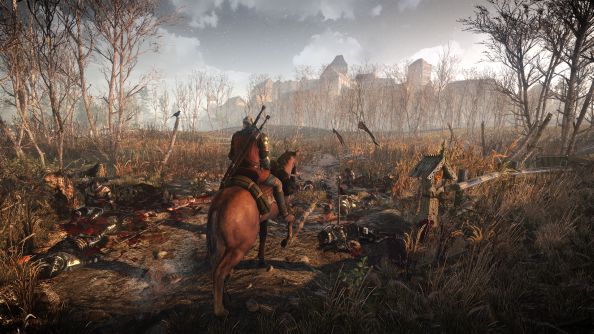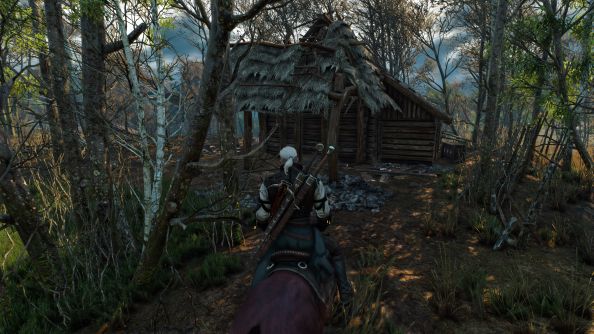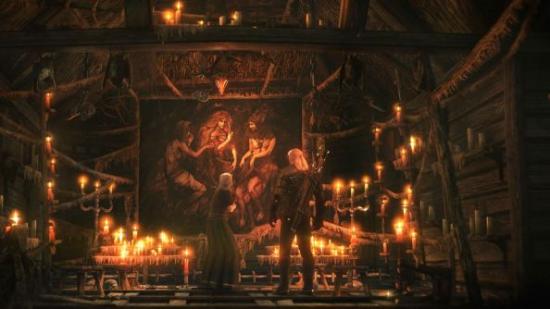The godforsaken land of Velen had a god once. A goddess, actually – but she went slowly mad and was killed by her daughters, who buried her beneath an oak tree twisted like a helter-skelter.
Not that anyone in the swamps will tell you that – most of the books in the Northern Realms are nestled in Novigrad, which is less damp and better lent to libraries. The details only matter to the locals insofar as a) the oak makes one heck of a creepy racket, and b) there’s no-one looking out for them. Or even noticing as they’re trampled into the gloop by armies on the way to conquer somewhere else.
The Witcher 3 stands among the great PC RPGs.
(There’s a joke of sorts associated with one hapless Velen village on the world map; an army passed by once without incident, and the hamlet celebrated – but like a hurricane the legion changed course and razed it just the same. You’ve got to expect a certain amount of gallows humour from a land that sprouts nooses like dandelions.)

In one settlement, situated between a mountain of wyverns and the whispering oak, a man cuts off his own ear and hands it to you. “Ye’re a stranger,” he tells Geralt, wincing through the pain. “Ye don’t know life here.” It’s payment for the protection of the Ladies – the mysterious mafia in a place unpoliced. The godless can’t afford to be too picky.
It’s not just that CD Projekt Red’s tortured land is grim; there’s nothing exceptional about that when low fantasy is in fashion, as evident in Dragon Age and Pillars of Eternity. It’s that I’ve rarely visited a fictional country so vivid, or one that checks out quite so convincingly.
Most of the information is never put down in one place, codexed up for further reading. But you can feel the weight of the bible somebody at the Polish studio must have written to keep everything straight. The Bloody Baron, Velen’s Brummie despot, won’t tell you where his colourful name comes from. But a local landlord mentions something about red paint pots accidentally tipped into a river after an altercation. The story’s scattered in the mud, but it’s all there.

While genre classics like Fallout 2 were celebrated for letting individual world designers run wild in their own corners, CDPR reveal the value of coherence. For all its miles of undulating terrain to ride across, there’s no such thing in The Witcher 3 as a side quest. Every diversion is in service to the place and its people, looping back to the central chronicle of mislaid friends, or at the very least solidifying the idea of the witcher himself as a monster hunter.
Geralt, contrary to the views of the entire Realms, is a joy to be around. The Witcher 3 wouldn’t pass muster as an RPG by Chris Avellone’s standards, since it ties you to a predefined personality with limited wiggle room for development. But I came to enjoy the company of a fully-fledged character, whose cold, empty exterior belies a world-weary wit, political consciousness, and concern for the inadvertent casualties of a war directed from a distant palace.
The sense of Geralt as a protagonist with a real profession, rather than simply a precept for wandering around interfering in everybody’s business, is supported by an economy in which coin has real value. You’ll haggle with quest-givers, risking losing the gig in the process, because a bottle of dwarven spirit isn’t cheap to come by and without one you won’t be able to heal in battle.

After years of waiting to see what western RPGs might learn from the Souls series – CD Projekt’s former colleagues at Lords of the Fallen devs Deck13 pulling rather too literally from the FromSoftware playbook – The Witcher 3 finally shows progress. The influence is there not only in the dodge-heavy combat, but the necessity for preparation. Witchers don’t rest, they meditate, and players are encouraged to stop and take stock: to study a monster’s moveset and bestiary entry, applying the appropriate oils and picking the right bombs. The most satisfying encounter isn’t a long and gruelling joust, but a short skirmish expedited by good planning.
Usually, though, when I think about The Witcher everything but Velen falls away. The time exiled witch Keira Metz hosted a slap-up dinner at her cottage in the woods, and I felt like I was attending a support group for well-heeled adventurers stuck in a sunken land. That time with the bloody tree. And the time it transpired that villagers had been leaving offerings for a disembodied voice which, unbeknownst to them, belonged to a greedy anthropomorphic goat living in a cellar beneath their feet. I didn’t interfere. The monster offered protection, after all, and the godless can’t afford to be too picky.
